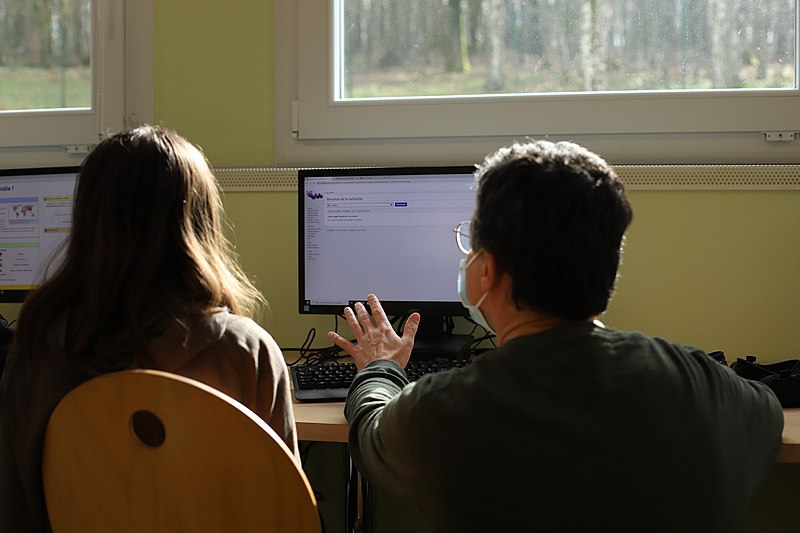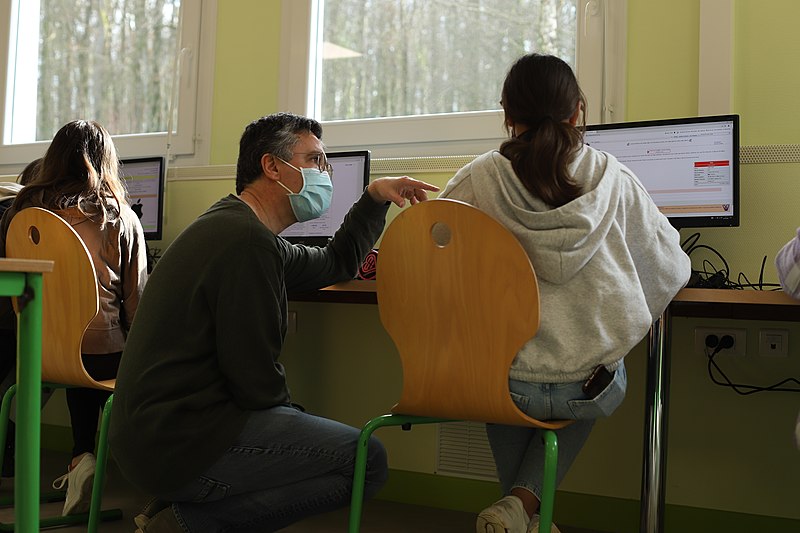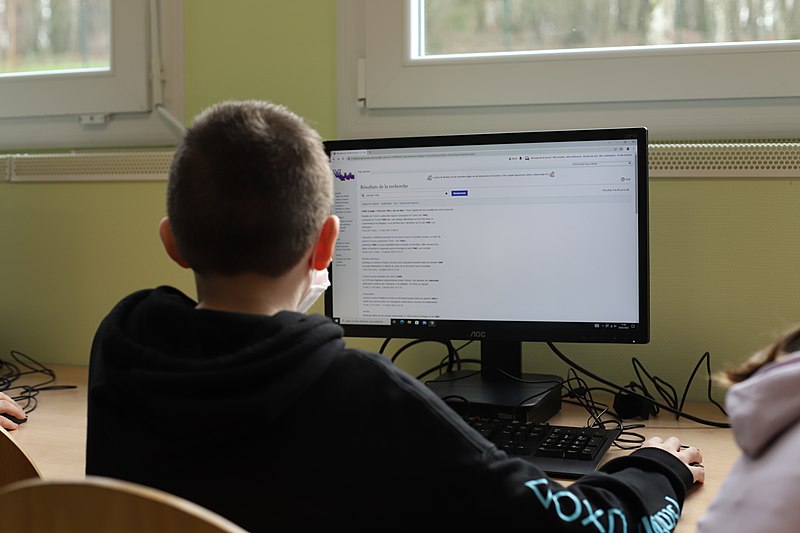L’une des actions phares de Wikimédia France est de promouvoir et d’accompagner les enseignants dans l’utilisation de Wikipédia – et plus récemment de sa petite soeur Vikidia – dans le cadre scolaire. Nous sommes effectivement convaincus de l’utilité des encyclopédies libres pour les projets pédagogiques, en particulier pour l’éducation aux médias et à l’information (EMI).
Mais que dit la recherche scientifique à ce propos ? C’est la question que je me suis posée au cours de mon année d’alternance au sein de l’association en tant que chargée de mission projets pédagogiques, et du master “AIRE : Learning Sciences” à l’Université Paris Cité. Dans le cadre d’un mémoire de recherche, je me suis penchée sur l’usage de Vikidia comme outil de socialisation aux savoirs, notamment en suivant une classe de cinquième dans un collège des Ardennes, et en interrogeant des enseignants au cours d’entretiens. Ce mémoire, rédigé à la façon d’un article scientifique, est précédé d’une revue de littérature, c’est-à-dire un état de l’art de la littérature scientifique. Cette partie introductive au mémoire avait pour sujet plus large l’usage de Wikipédia et des wikis comme outils pédagogiques. Après avoir sélectionné près de 30 articles pertinents sur la base de données ERIC [X] et sur la page projet dédiée de l’association (disponibles à la fin de ce billet), j’ai réalisé un travail de synthèse qui permet de rendre compte des intérêts multiples de l’usage de Wikipédia en classe. Ce billet restitue ce travail d’état de l’art.

Introduction
Les intérêts pédagogiques

Socialisation aux savoirs

Conclusions et horizons
- Barajas, M., & Frossard, F. (2018). Mapping Creative Pedagogies in Open Wiki Learning Environments. Education and Information Technologies, 23(3), 1403–1419.
- Barber, W., King, S., & Buchanan, S. (2015). Problem Based Learning and Authentic Assessment in Digital Pedagogy: Embracing the Role of Collaborative Communities. Electronic Journal of e-Learning, 13(2), 59–67.
- Barnhisel, G., & Rapchak, M. (2014). Wikipedia and the wisdom of crowds: A student project. Communications in Information Literacy, 8(1), 145–159. https://doi.org/10.15760/comminfolit.2014.8.1.158
- Bayliss, G. (2013). Exploring the Cautionary Attitude Toward Wikipedia in Higher Education: Implications for Higher Education Institutions. New Review of Academic Librarianship, 19(1), 36–57. https://doi.org/10.1080/13614533.2012.740439
- Bronner, G., Cayrol, R., Cordonier, L., Douzet, F., Farinella, R.-M., Favre, A., Garrigues, J., Harfoush, R., Khan, R., Muxel, A., Reichstadt, R., Roder, I., Warusfel, B., & Wierviorka, A. (2022). Les Lumières à l’ère numérique. https://www.vie-publique.fr/sites/default/files/rapport/pdf/283201.pdf
- Correia, A.-P. (2014). Student’s Online Learning Experiences in Collectivist Cultures. Association for Educational Communications and Technology, 53–58.
- Fessakis, G., & Zoumpatianou, M. (2012). Wikipedia uses in learning design: A literature review. Themes in Science & Technology Education, 5(2), 97–106. http://earthlab.uoi.gr/ojs/theste/index.php/theste/article/view/109
- Fulton, C. (2019). The use of collaborative open-access publishing via Wikipedia in university education to embed digital citizenship skills. Netcom, 33(1/2), 09–22.
- Gray, A. (2013). Wikipedia and information literacy. School Librarians, 61(1), 8–10.
- Lamb, A., & Johnson, L. (2013). Wicked or Wonderful: Revisiting Wikipedia. Teacher Librarian, 40(4), 68–73.
- Harouni, H. A. N. (2009). High School Research and Critical Literacy: Social Studies with and Despite Wikipedia. Harvard Educational Review, 79(3), 473–494.31
- Herrera, O. A., & Meijas, P. (2017). Peer Instructions and Use of Technological Tools: An Innovative Methodology for the Development of Meaningful Learning. International Association for Development of the Information Society, 59–66.
- Khan, H., & Martindale, T. (2014). A review of research on collaboration via blogs in online learning. Association for Educational Communications and Technology, 1, 96–104.
- Khany, R., & Khosravian, F. (2014). Iranian EFL Learners’ Vocabulary Development through Wikipedia. English Language Teaching, Vol. 7, Issue 7, pp. 57–67.
- Kukkonen, J., Dillon, P., Kärkkäinen, S., Hartikainen-Ahia, A., & Keinonen, T. (2016). Pre-Service Teachers’ Experiences of Scaffolded Learning in Science through a Computer Supported Collaborative Inquiry. Education and Information Technologies 21(2), 349–371.
- McKenzie, B., Brown, J., Casey, D., Cooney, A., Darcy, E., Giblin, S., & Ní Mhórdha, M. (2018). From Poetry to Palmerstown: Using Wikipedia to Teach Critical Skills and Information Literacy in A First-Year Seminar. College Teaching, 66(3), 140–147. https://doi.org/10.1080/87567555.2018.1463504
- Ladage, C., & Ravestein, J. (2012). Wikipédia à l’école, où en est-on aujourd’hui ? Actes Du Colloque International JOCAIR, 11.
- Pifarré, M., & Kleine Staarman, J. (2011). Wiki-supported collaborative learning in primary education: How a dialogic space is created for thinking together. International Journal of Computer-Supported Collaborative Learning, 6(2), 187–205. https://doi.org/10.1007/s11412-011-9116-x
- Polk, T., Johnston, M. P., & Evers, S. (2015). Wikipedia Use in Research: Perceptions in Secondary Schools. TechTrends: Linking Research and Practice to Improve Learning, 59(3), 92–102.
- Ruhalahti, S., Korhonen, A.-M., & Rasi, P. (2017). Authentic, Dialogical Knowledge Construction: A Blended and Mobile Teacher Education Programme. Educational Research, 59(4), 373–390.
- Sahut, G. (2014). Les jeunes, leurs enseignants et Wikipédia: Représentations en tension autour d’un objet documentaire singulier. Documentaliste: Sciences de l’Information, 51(2), 70–79.32
- Sahut, G., & Chabriac, K. (2015). Quand des lycéens contribuent à Wikipédia : quelles évolutions de leur connaissances informationnelles ? Éditions Du Centre d’Études Sur Les Jeunes et Les Médias, 108–118.
- Sahut, G., Jeunier, B., Mothe, J., Tricot, A., (2015). Qu’apprennent les jeunes usagers à propos de Wikipédia ? Presses Universitaires de Paris Ouest, 149–161.
- Sahut, G. (2017). Variations de la confiance et de la réputation de Wikipédia chez les jeunes (11-25 ans). Adjectif.net, 1–8.
- Swanson, T. (2006). Information Literacy, Personal Epistemology, and Knowledge Construction. October 2012, 37–41. https://doi.org/10.1300/J106v13n03
- Thomas, P., Jones, M. F., & Mattingly, S. (2021). Using wikipedia to teach scholarly peer review: A creative approach to open pedagogy. Journal of Information Literacy, 15(2), 178–190.
- Thompson, N., & Hanley, D. (2017). Science Is Shaped by Wikipedia: Evidence from a Randomized Control Trial. SSRN Electronic Journal. https://doi.org/10.2139/ssrn.3039505
- Vetter, M. A. (2020). Broadening representations of rhetoric in Wikipedia: disciplinary praxis as graduate pedagogy and research. Studies in Higher Education, 45(5), 990–1002.
Vignette : Albert Bettannier, La tache noire, 1887

 Faire un don
Faire un don